- Home
- Edmund White
Inside a Pearl Page 27
Inside a Pearl Read online
Page 27
I asked David what their door policy was.
“First, we let in all the blacks. Then all the gays. Then the celebrities. One night I recognized Allen Ginsberg and William Burroughs. The French girl I worked with thought that they were just a couple of old stumblebums.”
David was a favorite student of Mireille Huchon, the Sorbonne professor who wrote an influential study speculating that the great Renaissance poet Louise Labé didn’t actually write the works attributed to her, but was merely a front for several male poets. David was an expert in rhetoric and saw all of literature, I think, as mere combinations of rhetorical devices. He said that he loved my novel The Beautiful Room Is Empty and Harry Mathews’s Cigarettes for their “deployment of rhetorical figures”—a way of discussing literature that absolutely mystified me.
Though he was noble and handsome, with big muscles, he was a major masochist. He claimed proudly that no one had ever touched his penis. He liked to be severely lashed and fucked by his French lover, who was courtly and handsome, “a big nobody.” After his lover beat him, he would draw David a hot bath to ease the welts. I took David on a road trip through Morocco. At Taroudant, he pulled me into his bed and socked me in the stomach.
When David became ill with AIDS, his lover threw him out and he went home to Georgia. There his parents, who were poor Scottish immigrants, put him in a state hospital, which would never release him. Though there was nothing to be done for him and he wanted to die peacefully in his mother’s garden, the hospital was afraid of a lawsuit.
After he died I met some of his friends: the daughter of a deputy from the Franche-Comté who’d shot up heroin with him and an old college pal who’d attended college with him at the University of Georgia in Athens. From these friends I found out that in Paris “Davey” would get drunk and beat up fags under the highway in front of the Gare d’Austerlitz beside the Seine. He’d gloried in his steroid-hefty muscles, in how tough he was—and how much abuse he could take and hand out. And yet he’d had a refined way of talking, sipping air before every sentence as he was discussing the poetry of Ronsard.
I ended up going with another language scholar, Gilles, who wrote his prizewinning dissertation on the seventeenth-century writer Claude Favre de Vaugelas, a savant who was so poor that he sold off organs of his body to anatomists for collection after his death. MC and I, she outfitted in her shawls and dark glasses, attended Gilles’s brilliant defense of his thesis. His professorial parents from Marseilles were also there—and stared daggers through Valmont and Madame de Merteuil. Gilles was a mélomane who could listen to one symphony on the radio while humming another.
MC had laughingly given up on love, claiming she was too old for it. But several men floated mysteriously through her life. There was “the Chinese,” who wasn’t Chinese at all but a Peking correspondent of Le Monde. There was an Italian prince I’d found for her. MC was always banging on about how she longed to have an affair with an Italian prince, but when I located one, she decided he was underbathed and wouldn’t do at all. Then there was a man I’d never met, whom she called her transi, which means “bashful lover.” They would have private dinners together.
Once, when we traveled to Bruges to see a Memling show, the hotel had misunderstood and put us in a double bed. It was embarrassing to both of us, but we pretended the situation was normale, as the French say. Romantically, the French pride themselves on being “realistic,” and Marie-Claude never once got drunk and became amorous. If she had, it would have been torture to turn her down. Once, when she was serving dinner in Ré to her daughter and Michael and me, we were all looking at her silently with big eyes as she spooned out those great blistered potatoes. She became angry and said, “Stop looking at me as though I’m your mother.”
Chapter 22
I always write a book in longhand and then dictate to someone who types it. Of course I change lots of things as I go along and try to eliminate repetitions, unsnarl grammatical constructions, and correct mistakes. It usually takes a week or two. The whole process of dictating is tedious, since in order to get a clean manuscript you have to pronounce every comma and accent mark and spell out foreign words.
When I finished The Beautiful Room Is Empty in 1985 I dictated it to Rachel Stella, who became a close friend. Her father was the famous painter Frank Stella and her mother was Barbara Rose, the art critic, who had divorced Stella and married Jerry Leiber, half of the song-writing duo who’d written “Hound Dog.” Rachel’s mother loved to speculate in Paris real estate. Rachel and I started out working in a ground-floor studio on the Île Saint-Louis, and then we had to move to a grim studio a block away from MC. Rachel’s old, arthritic chow dog, with his blue tongue and sweet smile, kept us company. Rachel seemed like a tough chick because she spoke out of the side of her mouth in a hard-bitten way, but she was as sweet as her chow. Many things struck her as funny that left me cold; she had a very satirical eye. Even though her artist father was rich, he was married to a woman not Rachel’s mother, kept expensive polo ponies, and had grown up rich (self-made men, in my experience, can be more generous). He wasn’t very liberal in helping Rachel—in fact, very little if at all. French bourgeois parents would have been shocked; they usually buy their newly adult children their first apartment or house at least. The American sink-or-swim attitude strikes the French as cruel, and the idea of kids working horrible summer jobs to learn the value of a euro seems to them unreasonable. That so many Americans put their aging parents in old-age homes seems to the French harsh and unfeeling. If French people inherit wealth or property, they think of it as the patrimony of which they are only the custodians before it’s handed on to the next generation.
Eventually I introduced Rachel to the man she would marry, Pierre Aubry, a filmmaker with a permanently startled expression and the French equivalent of an Oxford stutter. For once I hadn’t planned on playing the matchmaker. Pierre came to dinner with a Chinese girlfriend he’d been with for ages. The Chinese woman offered to translate and get my work published in China, which seemed like a very remote possibility. Unbeknownst to me, that evening Pierre had a coup de foudre for Rachel, a life-changing event that had occurred to her as well. The very next day they were a couple. The Chinese woman left a tearful message on my machine saying that she couldn’t translate my work after all. Soon enough Rachel and Pierre were married; their daughter Rebekah Edmonde became my goddaughter.
Rachel had a gallery in the sixteenth where she sold works on paper. She was kind to my lover Hubert. When he was ill with AIDS she helped him turn from architecture to cartooning by publishing his first book of bandes dessinées. We met many people at her parties, some of whom Hubert caricatured, including the Albanian author Ismail Kadare. Hubert pictured himself with me and MC fawning over Kadare, and then in the next frame admitting none of us had ever read a word he’d written.
One couple I liked immensely was the illustrator Pierre Le-Tan, who’d illustrated many covers for the New Yorker, and his spunky English wife, Plum. He was always driving them into debt buying at auction beautiful hand-painted furniture that had belonged to the Duke and Duchess of Windsor. We liked to clown together. We would dine at Davé, a Chinese restaurant frequented by models and owned by the flamboyant Davé himself. Once we were discussing as we walked to the restaurant how we could avoid being kissed on the lips by our host. Neither Plum nor I could think of anything and got roundly bussed, but then clever Pierre went down on one knee at just the right moment and kissed Davé’s hand. Then we got Davé to show us photos of himself in drag. He had endless scrapbooks, which may have seemed less boring to Pierre than it was to me.
Pierre had grown up in Paris. He was Vietnamese and had known the last Vietnamese emperor in exile. He’d known everyone from Jean Marais (the actor and Cocteau’s lover) to the charming Baron de Rédé, who lived in the Hôtel Lambert on the Île Saint-Louis with Guy and Marie-Hélène de Rothschild and who invited me to lunch once with the photographer Ariane Lopez-Huici and her sculptor h
usband, Alain Kirili. Rédé and I had drinks in the Lambert’s perfect reception room, with its wood carvings of the labors of Hercules. Then we ate truffles and scrambled eggs in a small dining room painted by Mignard with murals showing this very room. From the windows we looked down on the garden designed by Le Nôtre. I’d always see Rédé at the Voltaire with Juliette Gréco’s sister; they were like little lovebirds, though in their eighties. I remember once introducing him to Leo Castelli, the art dealer, in the lobby of the Crillon. I thought the most famous man-about-town in Paris should meet his New York counterpart; they couldn’t have been less mutually interested. Leo was too obsessed with his new Italian wife, a twenty-something art historian.
I got to meet many American or Canadian writers in Paris I’d never encountered in New York. Foremost among them was Raymond Carver, whose granitic integrity as a man inflected the way I read his work—which had seemed mannered and faux naïve until I knew him. Because there were so few American writers living in Paris in those years, Odile Hélier at the Village Voice bookstore used to call on me to introduce visitors. The high point for me was publicly presenting Peter Taylor, who’d just won the lucrative Ritz-Hemingway award, to Carver, two of our greatest practitioners of the short story. Later Carver invited me to join him and Richard Ford and my old schoolmate Thomas McGuane on a salmon-fishing expedition in Oregon; I was flattered but said I didn’t know what to wear. Another memorable moment was meeting the mysterious Mavis Gallant, one of the few English-language writers who dared to write about French people interacting with other French people; everyone else, including Edith Wharton and James and Hemingway, wrote about Americans abroad. Gallant told me that she’d learned French as a girl in Montreal, though her parents were Anglophone and she always wrote in English. She’d lived in France so long that many of the men she’d known had died and their widows were helpless, like so many women of that generation, and she had to help them pay bills and handle their affairs. She was deep into the research for a book about Dreyfus, but she has never written it. I told her that my favorite book of hers was The Pegnitz Junction, about postwar Germans, and she told me, perhaps out of politeness, that it was her favorite, too. The last time I saw her she was completely bent over like a hairpin, but she straightened herself out and had lunch with several of us at the Select. We often saw each other at parties given by my friend and Princeton colleague, the poet C. K. (“Charlie”) Williams, and his effervescent French wife Catherine, a jewelry maker.
Charlie Williams introduced me to Ted Solataroff, the former editor of the New American Review, where I’d first read a chapter from Portnoy’s Complaint. Years later I met Philip Roth through his fellow New Jerseyite Charlie, though I doubt if Roth remembers me. It was an honor to meet authors whose work brought me so much pleasure, though I remembered James Merrill once saying to me about some young fan, “Why does he want to meet us in the flesh? Doesn’t he realize the best part of us is on the page and all he’ll be meeting is an empty hive?”
Chapter 23
A year after Hubert died I received a long letter from a thirty-year-old writer named Michael Carroll, who was living in Pilsen, in the Czech Republic. He was teaching English in the university there for the Peace Corps. My then agent sent the letter along (hers was the only address he had for me) and scrawled in the margin, “Sounds like a live one.” Now we’ve been together eighteen years.
I’d been terribly lonely and thought I’d never meet someone else. He’d given me an address, so I wrote him a postcard and told him if he was ever in Paris to come by for lunch. I jotted down my phone number.
On Easter weekend he called me from a nice youth hostel near the rue Saint-Martin. I invited him right over. He thought Hubert was still alive and had no idea I was prospecting for someone. He was handsome, sweet, but not demonstrative; though he was thirty he looked twenty. Later I found out his whole family is genetically favored toward youthful looks. We shared a southern background of sorts. My parents were from Texas. I’d lived in Texas. He’d been born in Memphis. My paternal grandfather had been a college teacher because he said he wanted a job “out of the sun.” Michael’s father (a year younger than I) had been the first person in his family to go to college; he manufactured wallboard. Michael had grown up in northern Florida, which is very redneck. And yet he’d had a very good education in public schools, in “gifted” classes where they’d read Greek plays, Shakespeare, the Victorians. He’d gone to grad school for English and then creative writing, but he wasn’t very confident about his own stories—though he was very sure, even adamant, about his taste.
He had such a cozy, unemphatic way of becoming intimate. I read him out loud a story I’d just written and he said sensible things about it. He sat on the floor and I on the bed. We went to bed and that, too, seemed very intimate. I was fifty-five but still randy; I hadn’t yet learned to wait for encouraging signs from the other person. I was far too old to be everyone’s cup of tea, but I hadn’t learned that yet.
I realized it had cost Michael a month’s salary and sixteen hours to come on a bus to Paris from Pilsen. I insisted he move out of his hostel and stay with me. On subsequent trips I paid his airfare to Paris and back to Prague. And I flew to Prague twice to court him. I was in love with him almost instantly, but he was much cooler, which slightly miffed me. He told me that in August his term of duty in the Peace Corps would be up; I wanted him to move to Paris.
Michael and I were lying in bed at the end of August 1997 when Jonathan Burnham phoned and said, “Isn’t it terrible what happened in your city?”
I’d sung a few scales before lifting the receiver and now I tried to drive the sleep out of my voice. “What happened?”
“Princess Di died in a car crash there in Paris last night,” he said.
Only a year before Jonathan had had dinner with Diana and said what a hysteric she was, gabbling and fiddling with her hands nonstop—and I’d always wanted to believe this version.
And yet I knew how compassionate she was as well. I had done a profile of Marguerite Littman, a southerner who’d joined her AIDS charity to those of Princess Diana and Elton John. Lucretia Stewart’s husband’s brother had died of AIDS. The princess was one of the first people who’d visited him in the hospital and had not been afraid to touch him. Somehow she knew the disease wasn’t catching. Everyone who’d worked with her on her AIDS charity was awe-struck by her warmth and courage (she’d lost many friends to the disease) and her unfailing dedication.
In the next few days we were scheduled to fly to the States for the American book tour of my novel The Farewell Symphony, and the following winter I was planning to begin teaching on a trial basis at Princeton. Suddenly Princess Di’s death consumed the media, and gone were most of my choicest interview and coverage prospects, including an appearance on Charlie Rose. The Farewell Symphony took in the whole period of New York gay life leading up to the AIDS crisis, sweeping in the euphoria of gay liberation as its cruel prelude, and one by one killed off most of its characters—and it was the capstone of my autobiographical trilogy.
So much for my triumphant return to native soil.
I’d emphasized the phrase “trial basis” when relaying the news of my upcoming teaching gig, but MC, perhaps sensing my deeper hopes, wasn’t buying it. Her work had advanced, and more and more I admired some new effect she’d managed to achieve in her boxes, but she had yet to find a new gallery to show her latest efforts. Though her energy never flagged, she was the same old little girl in search of approval to shore up her confidence. She turned to Michael and asked him if we weren’t in fact planning a permanent move.
Then, one evening as I was saying good night to her after one of our small quiet dinners together, just the two of us, she confronted me with a mixture of command and frail emotion and pleaded, “Just give me one more year!”
I was relieved finally to have a job. I was sick of scrambling at the end of every month to pay my rent. And Michael had never taken root in Paris. His w
hole life he’d dreamed of living in New York, and as an aspiring young writer it seemed the perfect place for him to be. The first year we had to live in Princeton till I officially got tenure, but then we moved to New York into an apartment I bought—or rather the bank did. My hand shook as I signed the mortgage agreement, the first one I’d ever signed. Before I got tenure and we began the apartment hunt, however, we rented professors’ houses in Princeton the first two semesters, and I whimpered every evening as the dog next door howled.
There we were in a subdivision. The doors to the neighbors’ houses were all shut, the lights in most of the windows extinguished, and I complained to Michael, “Why don’t people ever come outside?”
“What are they supposed to do when they come outside, get in their cars? It’s winter.”
“But it’s like they’re hiding. It all seems so sordid. What are they doing in there?”
“What everybody anywhere else does. Eating, watching TV, reading, and going to bed.”
Michael had grown up in a suburb, and though it had never been his dream to stay in one, it didn’t bother him as much as it did me. He enjoyed being able to drive to a grocery store that stayed open late into the evening instead of having to hurry out to the markets before dark.
At the first hint of spring, MC came for her first drily amused visit, and on our tours of the New Jersey countryside rode in the front seat next to Michael (terrified of cars and accidents, I prefer to ride in the back). She looked out at the profusion of shocking-magenta redbud bushes in bloom on the lawns and croaked, “Mais c’est vulgaire.”
For months she’d been ramping up her satirical and alarmist colorings of small-town life in America, which—remember—she’d had a taste of back during the Babar tours in the old days. Suburbia was where the true horrors were perpetrated, bastions of puritanical pettiness and hypocrisy, with all that wasted space and all those locked doors to help hide it.

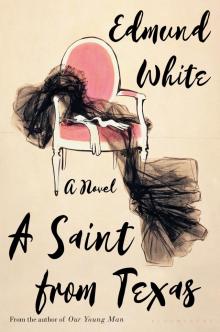 A Saint from Texas
A Saint from Texas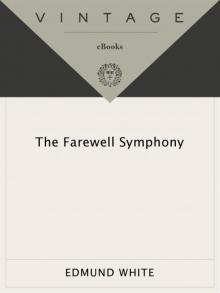 The Farewell Symphony
The Farewell Symphony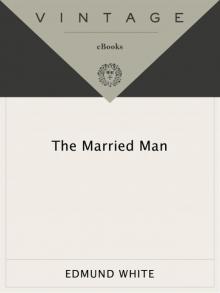 The Married Man
The Married Man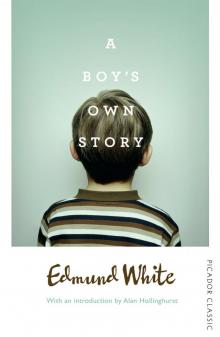 A Boy's Own Story
A Boy's Own Story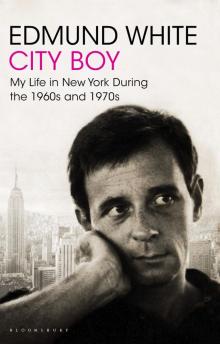 City Boy
City Boy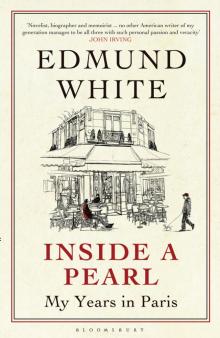 Inside a Pearl
Inside a Pearl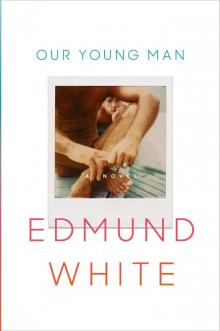 Our Young Man
Our Young Man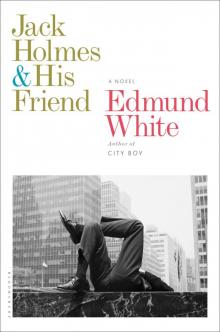 Jack Holmes and His Friend
Jack Holmes and His Friend